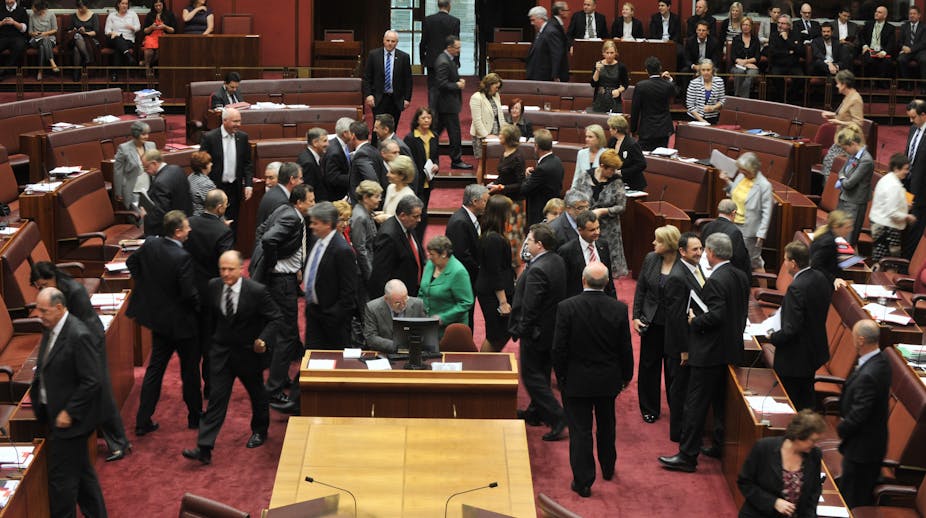Tony Abbott seems to have been entirely surprised by the entirely predictable. The Australian Senate has been amending and rejecting government legislation since federation. Yet in the lead-up to the last election Abbott declared that:
There will not be deals done with independents and minor parties under any political movement that I lead.
Last week, the prime minister called them “feral”. He’s not off to a good start.
But Abbott is not alone in ignoring the crucial role played by crossbench and backbench members of parliament. The media and academics often pay too little attention to the people to whom the constitution has given veto power over policy.
Every time an Australian goes grocery shopping they derive a lasting benefit from the transitory power of the Australian Democrats. John Howard, Peter Costello, the Australian Treasury and the overwhelming majority of academic economists thought removing food from the GST made no sense. The Democrats disagreed.
Significantly, unlike the bureaucrats and the academics, the Democrats got to vote in the Senate. Despite his personal preferences, Howard agreed that a GST on most things was better than a GST on no things.
It is not only crossbenchers but backbenchers from the major parties who often act as the “marginal” member whose final position shapes the outcome. In order to privatise Telstra, Howard persuaded Mal Colston to quit the ALP and vote with the Liberals in exchange for promoting him to deputy president of the Senate.
Such chaos! Such uncertainty! I don’t remember the business community complaining about those shenanigans, and I certainly don’t remember the Coalition crying foul.
Julia Gillard pulled a similar trick with Peter Slipper when she was in a minority government supported by the Greens’ Adam Bandt and three independents. Perhaps unsurprisingly, many of those who sat mute or quietly cheered when Howard did “whatever it takes” to win his Telstra vote howled in outrage at Gillard’s gambit.
Political commentators spend a lot of time talking about focus groups and marginal voters. Political scientists spend a lot of time talking about “evidence-based policy” and orderly “policy cycles”. But while they may disagree about what “really” drives policy, both groups often overlook the role of the “marginal member of parliament”.
Chaos? Or just the way the system works?
In our recent book, Minority Policy: Rethinking governance when parliament matters, Brenton Prosser and I draw on historic and international evidence to spell out the crucial role of the independent MP or minor party bloc of votes that have the final say on the form, and passage, of legislation.
Rather than analyse the role of the crossbench, and backbench through the prism of “chaos”, we seek to understand their motivations, analyse their strategies and discuss the role they have played in Australian policymaking.
For 27 of the last 30 years, the Australian government has lacked a majority of the votes required in the Senate to pass legislation without the support of independent or non-government senators. Queensland and the ACT are currently led by minority governments and no Australian state is governed by a party with a majority in both houses. But dealing with the crossbench is not “the new normal”; it has ever been thus.
In writing our book, we interviewed former backbench and crossbench MPs, state and federal, in order to better understand the motivations, tactics and objectives of parliamentarians whose individual votes have, at times, led to the passage, defeat or amendment of legislation. Perhaps unsurprisingly, all of the “marginal members” we interviewed thought it was their role to shape, or block, the passage of legislation that affected their constituencies.
But while crossbench and backbench MPs often play a crucial role in the final shape of legislation, this role is largely ignored in academic and media analyses of policymaking. Even the bureaucracy often appears to be blindsided by the bleeding obvious – namely, that those with the power to block a reform often choose to do so.
Crossbench vote on the rise

In the past 30 years, Australian voters have been electing steadily more minor party and independent members of parliament. While modifications to the voting rules may change the composition of minor party candidates that get elected, only the most radical and undemocratic of voting reforms would significantly reduce the number of crossbenchers who get elected.
Whether this leads to “crisis” or a more consultative style of parliamentary decision-making will be determined by the personalities of those we elect and the expectations of those who vote. For those who argue that minor parties are nothing more than an unexpected consequence of voter frustrations, it is important to reflect on the Senate by-election that took place in Western Australia soon after the Abbott government took office.
In the lead-up to the April 2014 Senate by-election, Abbott made clear that he wanted a mandate from the Western Australian voters. The Liberal Party vote fell by more than 5%. So did the ALP vote, while the vote for minor parties and independents hit an all-time high.
The Constitution spells out quite clearly that a new law can only be made if a majority of both houses of parliament support it. Given how unusual it is for a government with a majority in the lower house to simultaneously hold a majority in the upper house, the role of “marginal members” to break or shape legislation should be well understood by journalists, political scientists and especially prime ministers.
While recent events suggest that the role of the crossbench has been overlooked by some who should know better, it is likely that recent events will reduce the chances of such an oversight occurring again. At least for another generation.
Minority Policy: Rethinking governance when parliament matters (MUP 2015) will be launched in Melbourne on Tuesday, March 31, at 6.30pm in the Institute of Postcolonial Studies boardroom (RSVP here).

